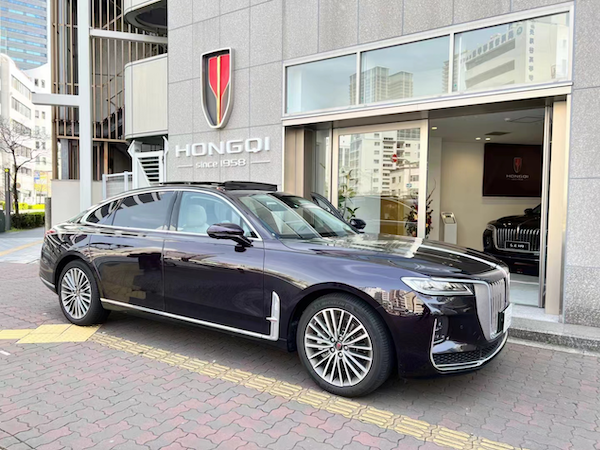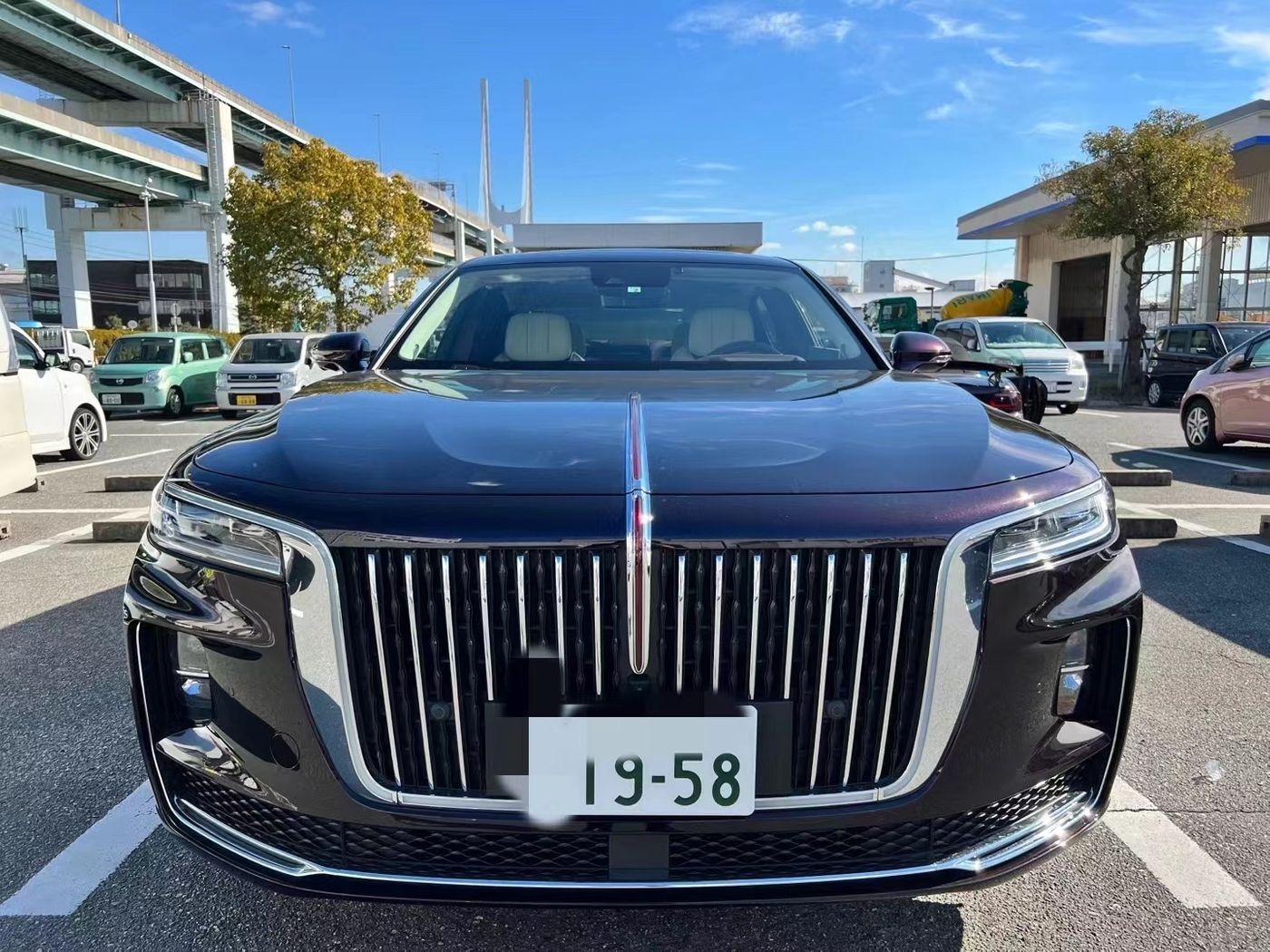
向日葵的爱https://tieba.baidu.com/home/main?un=%E5%90%91%E6%97%A5%E8%91%B5%E7%9A%84%E7%88%B1&fr=pb&ie=utf-8&id=tb.1.1cd9ae0f.nzrRWDC8MqXgN29zPMwuCA
Long "Journey to the East": Selling Red Flags to Japan
"Do you know how difficult it is to get a Chinese brand passenger car to be licensed in Japan?" Wang Li, chief operating officer of the Hongqi Japan Experience Center, told Yicai.com recently. Wang Li was the first person to sell Hongqi to Japan, and the first person to realize the registration of Chinese brand passenger cars in Japan.
One day in December last year, Japan's first Hongqi experience store opened in Osaka, attracting many Japanese media onlookers. But behind the lively scene, Wang Li said that it was actually full of bitterness.

Photo courtesy of Wang Li, Hongqi's flagship store in Osaka, Japan
After more than 1,000 pages of A4 paper, more than 60 safety certifications, a lot of translation work, and many applications were rejected, Wang Li finally succeeded in getting his first Hongqi car in Japan. Every time a new model is introduced in the future, Wang Li needs to go through this process again.
After successfully introducing Hongqi to Japan, other independent brands approached Wang Li, hoping to sell vehicles to Japan through him. But after getting a general understanding of the overseas certification of these independent brands, Wang Li was discouraged. He said, "If independent brands want to go abroad more smoothly, they still need to do more vehicle certification work to meet the requirements and rules of the international market." From this perspective, the globalization of Chinese car companies still has a long way to go. Way to go.
At present, China's passenger car market has entered the stage of stock competition, which has also made domestic car companies who have enjoyed high growth dividends for more than ten years gradually realize that global transformation will be the only way to go. From the data point of view, since last year, the number of my country's automobile exports has been increasing rapidly, but the proportion of the total volume is still not high. It is still in the initial stage of going overseas, and difficulties are inevitable.
The Japanese market, which is an automobile powerhouse, has always been relatively closed. The difficulty of overseas expeditions for independent brands can be seen from the story of Wang Li selling red flags in Japan.
The difficult road to "compliance" in Japan
Wang Li's connection with the automotive industry dates back to 1999. That year, 19-year-old Wang Li went to study in Japan. After graduation, Wang Li, who loves cars, sold domestic brand tires in Japan and became the Japanese general agent of Triangle Tire.
In 2012, Wang Li expanded its business to the import, repair and modification of parallel cars. The agents are mainly European brands such as Ferrari, Lamborghini, BBA (Mercedes-Benz, BMW, Audi).
It is because of these experiences and blessings that in 2018, Wang Li had the opportunity to have the first direct contact with Hongqi, which also opened the prelude to this story. At that time, a friend asked Wang Li to help get a Japanese license plate for a Hongqi H7. Although there was no successful experience of Chinese brand passenger cars in Japan before, but Wang Li still agreed with the mentality of giving it a try.
Afterwards, Wang Li found that entering the Japanese market, the Chinese self-owned brand and the European car brand he had previously represented were not at the same level of difficulty.
In the early 1950s, the European car market was developing rapidly, but regulations and certification agreements in various countries hindered the development of the car market. In order to promote the exchange and trade of automobile technology among countries, the United Nations signed the "Agreement on the Approval of Motor Vehicle Equipment and Components under Uniform Conditions and the Mutual Recognition of This Approval" in Geneva, Switzerland in March 1958 (referred to as the "1958 Agreement"). , which aims to formulate and implement uniform automotive technical regulations for automotive products within Europe.
With the increase of contracting parties to the 1958 Agreement, Japan also joined the Agreement in 1998. As a result, European car brands do not need much certification to sell in Japan. But China has not joined the "1958 Agreement" so far, so if Chinese cars want to enter Japan, all procedures must be started from scratch.
In Japan, all parts in a car have a set of fixed standards, which are called security standards, including various safety certifications, mechanical certifications, etc. Wang Li said that if a Chinese brand passenger car is to be successfully licensed in Japan, it must meet this set of standards. If it does not, it needs to be refitted in advance.
Wang Li gave an example of lighting. In China, driving on the right, in order to prevent dazzling oncoming drivers, the low beams of domestic cars are designed to be high on the right and low on the left, while in Japan, driving on the left is just the opposite, and the low beams must be high on the left and low on the right. For another example, Japan requires that the rear fog lights of a car cannot be lit on both sides at the same time, but only on the right side; while in China, the left side or both sides can be lit at the same time.
"There are countless such cases in the review process." Wang Li pointed out that in order to comply with Japan's security standards, the earliest materials he prepared were more than 1,000 pages of A4 paper, of which there were more than 60 security certifications. The submitted materials were then checked back. Wang Li's application for the red flag H7 to be listed lasted for more than half a year, and he finally completed the registration.
In order to prevent trade barriers when exporting, Chinese car companies actually need to do a lot of certification in advance. "Going out is not just empty talk." Wang Li said that because many countries use the "1958 Agreement", it is difficult to get a license in Japan. The same is true in Europe. Many independent car companies have found Wang Li, hoping that he can also bring his brand of vehicles to Japan. But in terms of specific vehicle certification, Wang Li found that almost all of these car companies are lacking.
"It can only be said that the globalization of many companies is just a slogan," said an executive of the overseas business of an independent car company.
The main force buying red flags is the Chinese
The reason why he agreed to cooperate with FAW-Hongqi is because in Wang Li's mind, Hongqi has always had a different status from other independent brands. "People in China may not be able to understand this special feeling of the Chinese in Japan. As long as we have a relationship with China, we will feel more cordial, not to mention the red flag." Wang Li said.
In the eyes of Chinese people, the unique history has made Hongqi beyond the meaning of a car brand, and it has also carried more simple national complexes. Wang Li is also eloquent when talking about the history of Hongqi.
In May 1958, China FAW produced the first high-end car "Dongfeng" CA71. In September of that year, the car was officially renamed "Hongqi". Since then, the Hongqi car has become synonymous with China's auto industry, and has become a national leader and national leader. It is a state car for major events, and was written into the "World Automobile Yearbook" in 1960.
In 2018, on the 60th anniversary of its birth, Hongqi released a new development strategy. FAW-Hongqi has continuously undergone earth-shaking changes in brand, product, channel marketing system construction and diversified cooperation, and sales have also increased significantly. From 4,702 units in 2017 to over 300,000 units in 2021, Hongqi's sales have grown nearly 63 times in four years.
While developing rapidly in China, Hongqi also began to target overseas markets. Based on the Chinese people's feelings for Hongqi, Wang Li said that Hongqi's positioning in Japan was clear from the beginning, that is, it mainly served Chinese businessmen and overseas Chinese and Chinese groups mainly based in Chinese-funded institutions in Japan.
In the second year (February 2020) when Wang Li and FAW-Hongqi officially reached a cooperation agreement, three overseas Chinese who had been doing business in Japan for a long time ordered three Hongqi H9s. At present, Hongqi has sold more than 20 cars in Japan, and most of the car owners are Chinese. Wang Li pointed out that among these car owners, none of them considered buying after seeing the car. car. These car owners will also apply for license plate numbers with special meanings for Hongqi cars, such as "1949", "1958", "1001"...

Feelings are Hongqi's precious and unique assets, and can become a weapon for Hongqi to fight overseas.
According to the blue book "Report on Overseas Chinese in the World (2020)" compiled by overseas Chinese graduate students in my country, as of 2019, there were more than 67 million Chinese overseas Chinese, including new immigrants, in 198 countries and regions in the world. The local society is a force that cannot be ignored, and overseas Chinese generally have patriotic feelings.
According to the 2020 census data released by the Japanese Ministry of Internal Affairs and Communications, there are more than 667,000 overseas Chinese in Japan.
But it is also a double-edged sword. In addition to the tedious vehicle introduction process, the most headache for Wang Li is that he often hears a lot of voices questioning the strength of Hongqi's products, and he can't help but "return", but this phenomenon is unavoidable.
In addition, factors such as vehicle language and navigation system that are not suitable for the Japanese market have adversely affected Hongqi's increase in sales in the local market. Wang Li said that there were also Japanese who came to consult and wanted to buy a Hongqi car. He joked that "only if you reach Chinese level 10 will you sell it to them". Because the current level of intelligence is getting higher and higher, for example, if the outside air is detected to be dirty, the car will prompt to automatically switch to the in-car circulation. If the driver cannot understand Chinese, the driver will think that there is a fault and the user experience is not good.
"Hongqi manufacturers did not put forward specific goals, but they asked me about their own plans. According to my thoughts, Hongqi's sales and outlets should be expanded in Japan, and vehicles should be improved a lot. For example, Japanese navigation and Japanese car-machine system, which If the two problems are solved, it will be easier to sell." Wang Li said.
Like my work?
Don't forget to support or like, so I know you are with me..
Comment…